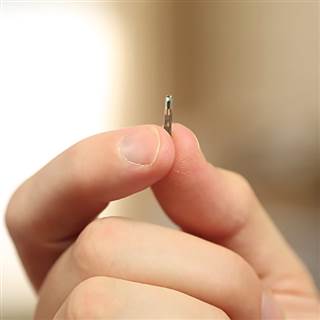In today’s world, many companies use some sort of electronic security badges for security. But at least one American company is taking a step beyond the plastic badge on a lanyard with a few smarts built in. That company is a Wisconsin tech outfit called Three Square Market, which specializes in microchip technology for micromarkets (self-checkout food vending setups). What Three Square is doing is giving its employees the option of getting an implanted microchip to take care of things that they have been using their badges (or the change in their pockets) for.
With the wave of their hands, employees will be able to open doors that require identification cards, log into their computers, operate copy machines or pay for snacks out of the company’s vending machines, the company said. (Source: NBC News)
Those opting to get implanted will have a microchip injected, via syringe, between their thumb and forefinger.
The chips operate on electromagnetic fields and must be no more than 6 inches from a device that can read them, known as radio-frequency identification.
Not surprisingly, some employees have voiced concerns about privacy and safety. The company counters the objections by pointing out that the technology has been approved by the FDA. Plus, the company’s CEO, Todd Westby points out that:
… the chip isn’t used for tracking people and has no GPS device. Since it’s “passive,” it also can’t be hacked, he added. “The chances of this being hacked into is literally nil to none,” Westby said.
And, of course, it’s optional. (That said, the majority of employees have signed up to get implanted starting August 1.)
A number of non-employees are voicing concerns about this technology. Some of these concerns are coming from religious groups that believe the microchips are the Bible’s Book of Revelation “mark of the beast. Others are coming from those who see this first American foray into subcutaneous microchips in the workplace as a slippery slope. One such of these is Duke computer science Professor Vincent Conitzer.
“If most employees agree, it may become a workplace expectation. Then, the next iteration of the technology allows some additional tracking functionality. And so it goes until employees are expected to implant something that allows them to be constantly monitored, even outside of work,” Conitzer said.
“And unlike with a card, phone or ring, the employee cannot easily and selectively remove the device,” he added. “Now is the right time to have a robust societal conversation about what we would like to see happen, rather than just seeing where things go and then realizing we can’t go back.”
While we’re all about embedded systems, Critical Link isn’t about to start implanting microchips in our colleagues any time soon. And we absolutely don’t want to monitor who’s taking a bio break, or when they go to lunch. We have a lot of snack food in the kitchen, but it’s all free and you don’t need to swipe your badge to get at it.
Still, this is an interesting bit of news, and we’ll be keeping our eye on where things go from here.
